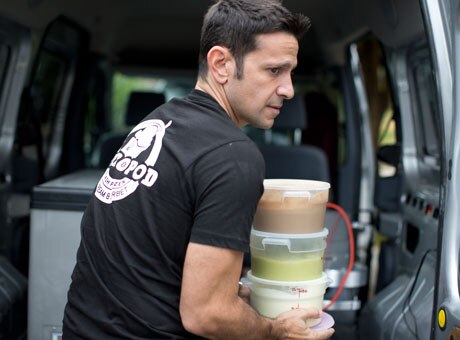Starting a catering company can take your passion for delicious food and turn it into a lucrative business. Compared to owning a restaurant or even a food truck, a catering business has less overhead and tremendously more flexibility. While the barriers to entry for catering are low, you must clear a few hurdles to ensure your business is legally compliant. Depending on province and municipality, a catering company requires a series of business permits and licences to operate. Liability insurance is also a must. Proper business planning ensures that you account for sales taxes properly and deal with employee gratuities appropriately. You also must decide whether to use a commercial or home kitchen to prepare food.

Absolutely Tasty and Totally Legal: How to Start a Legit Catering Company
Permits and Licences
Because a catering business involves going to people’s homes and businesses and serving food, the Canadian government imposes regulations to help ensure safety for consumers. You need to obtain the proper business permits and licences before hanging your shingle and officially opening your doors. The exact credentials you need vary by province and municipality a business licence in Toronto is different from a business licence in Edmonton and the Canada Business Network’s website is a good place to determine which ones that apply to you. Generally speaking, a food safety inspection of your premises is required, and some jurisdictions require licences specific to food handling. You need a liquor licence if you plan to sell alcohol. Even if you don’t sell alcohol, but you allow customers to bring wine from home for your catered events, a bring your own wine endorsement is required. A separate licence, called a special event permit, is necessary for selling alcohol at events such as weddings and charity fundraisers.
Professional Liability Insurance
Before opening your doors, ensure that you have proper insurance in place to protect yourself and your business against any mishaps. For a caterer, this means general liability insurance and professional liability insurance. This blanket coverage protects you if, for example, an employee slips and falls in your kitchen or a customer gets food poisoning from undercooked chicken. No matter how well you run your company, if you stay in business long enough, you’re going to get sued. Make sure you protect yourself with insurance.
Proper Accounting
Like all businesses operating in Canada, catering companies required to pay sales taxes on the revenue they generate from providing catering services to customers. A goods and services tax and provincial sales tax comprise Canadian sales taxes. Some provinces simplify things by combining the two taxes into a harmonized sales tax. If your business is located in one province but serves customers in a different province or in multiple provinces, the sales tax rate you must collect is the one that corresponds with the customer’s home province and not the province where your business is located. Collect sales tax by adding the proper rate to the price of services, and remit taxes owed by filing with the Canada Revenue Agency at the end of each reporting period. Many customers tip catering company employees, sometimes quite generously. As the business owner, policies exist to govern how you treat these gratuities. In short, any tips your employees receive are theirs to keep; you are forbidden from confiscating them or making deductions from them when you are paying your workers.
Commercial vs. Home Kitchen
Perhaps the biggest decision you’re faced with when starting a catering company is whether to operate out of a commercial kitchen or from a home kitchen. Both options have definite pros and cons. Most caterers who start with home kitchens do so because of the lower expenses involved. However, just because you choose a home kitchen as opposed to a commercial kitchen doesn’t mean you can simply set up shop with the way your kitchen is now. A safety inspection is still required, and the government is probably going to require that you install appliances, equipment, and other features to bring your kitchen up to par with government safety standards. Most home kitchens do not come outfitted like this, so be prepared to spend a little money to bring your kitchen up to code. A potential middle ground for business owners who lack the funds to purchase a commercial kitchen but want a more suitable space than a home kitchen offers is to lease commercial kitchen space on a per-use basis. In fact, many nonprofit organizations, such as churches and charities, have kitchens that are government-compliant, since these businesses often host catered events. Because they are nonprofit organizations, they might be willing to help a new business owner get established by offering the use of their kitchen at an affordable rate.


